Sustainable Water Infrastructure for the Next Generation: ‘Water 2040 Fund – Decentralized Water Circulation System Implementation Fund’ Launches – Nationwide Applications from Local Governments Open Starting Tuesday, July 8.
-Toward the realization of the early practical implementation of decentralized water and sewerage systems, as outlined in the ‘Basic Policy 2025’-
WOTA Corporation (Head Office: Chuo-ku, Tokyo; Representative Director and CEO: Yosuke Maeda; hereinafter “WOTA”) has announced the establishment of the “Water 2040 Fund – Decentralized Water Circulation System Implementation Fund,” a comprehensive support program designed to assist local governments across Japan introduce decentralized water circulation systems.
As Japan faces dual challenges of declining population and aging pipeline infrastructure, many municipalities are grappling with structural issues in maintaining and renewing their water and sewerage systems. The Water 2040 Fund is designed to provide medium- to long-term, end-to-end support for the entire implementation process and use of decentralized water systems—from planning and financing to operational management, thereby helping build sustainable and resilient water infrastructure. As part of this initiative, WOTA will leverage its proprietary household water circulation system, the “WOTA Unit.”
In recent years, issues surrounding water infrastructure have become particularly severe in depopulated areas, mountainous regions, and remote islands. Delays in pipe replacements, damage and leaks in aging infrastructure, and growing financial deficits are leading many municipalities to face difficult decisions such as raising water rates or scaling back services. Against this backdrop, the Japanese government, in its “Basic Policy on Economic and Fiscal Management and Reform 2025 – Toward a Society Where Tomorrow Is Better Than Today” (adopted by Cabinet in June 2025), explicitly states the goal of “early practical implementation of decentralized water and sewerage systems.” This marks a clear policy direction toward more sustainable water infrastructure.
The Water 2040 Fund aims to bridge the gap between national policy trends and the ground challenges faced by municipalities, serving as a tangible catalyst for the transition to sustainable water infrastructure. Drawing on its extensive technical and operational experience in decentralized water systems, WOTA will collaborate with financial institutions and local businesses to support municipalities through close collaboration—including leveling out initial investments, assisting in the development of implementation plans, and helping establish robust operational frameworks post-deployment.
Starting Tuesday, July 8, 2025, WOTA will begin accepting applications from municipalities interested in utilizing the Water 2040 Fund to implement decentralized water circulation systems.
– Water 2040 Fund-Special Site –


Challenges and Policy Trends Surrounding Japan’s Water Infrastructure
Japan’s water supply and sewerage systems have long delivered a consistently high level of service, ensuring the stable provision of potable water to over 98% of the population and making significant contributions to public health through effective wastewater treatment. However, Japan now faces structural challenges in maintaining and reconstructing its water infrastructure, as a result of both a rapidly declining population and aging infrastructure. These issues are especially pronounced in depopulated areas, mountainous regions, and remote islands, where many local governments are struggling to sustain and upgrade existing water and sewerage systems.
Financial Outlook for Water and Sewerage Services (2023–2050)
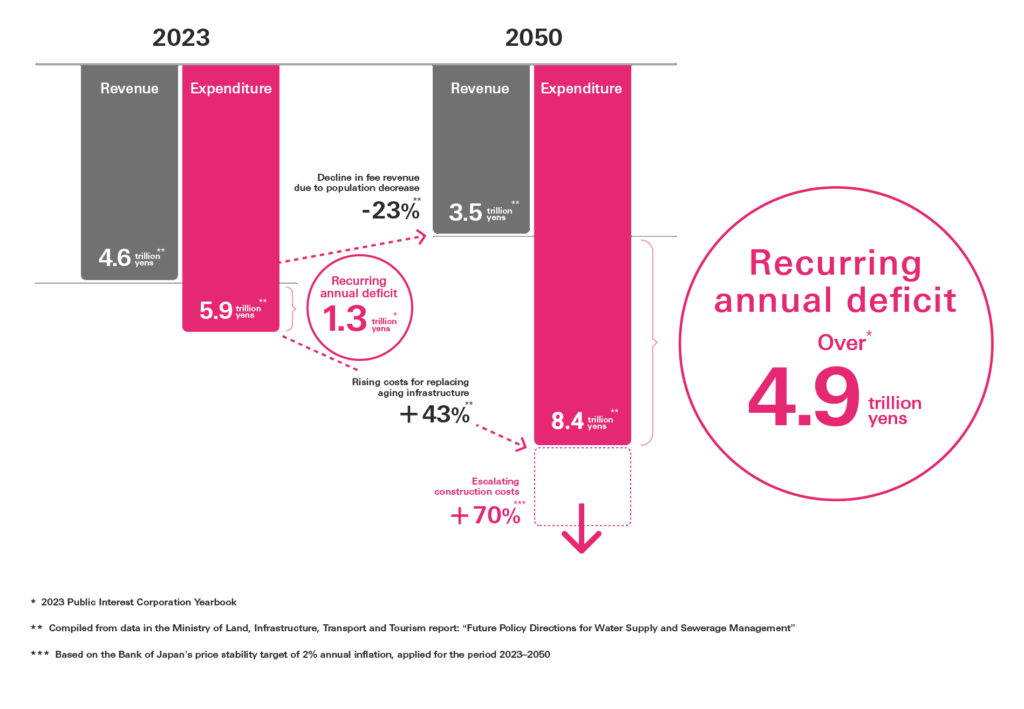
*FY2023 Public Utility Yearbook
**Edited Data from MLIT’s Report: “Future Policy Directions for the Management of Water and Sewerage Systems”
***Applying the Bank of Japan’s 2% Inflation Target Over the Period from 2023 to 2050
The average cost of replacing water pipes in Japan ranges from approximately 100 to 200 million yen per kilometer and is expected to rise further due to increasing material and labor costs. In fact, between fiscal year 2020 and 2024, the national average replacement cost rose by about 20% (※1). For example, in Osaka City, actual expenditures have been reported to reach twice the initially planned budget.
Furthermore, a 2024 survey conducted by the Ministry of Internal Affairs and Communications found that about 60% of municipalities nationwide reported delays in seismic retrofitting efforts, with many citing a lack of financial resources as the primary reason. Due to such fiscal constraints, necessary pipe replacements are often postponed, bringing greater risk of damage and leakage from aging infrastructure. Consequently, an increasing number of municipalities are being forced to consider raising water rates or scaling back services.
Japan’s water and sewerage infrastructure now stands at a critical turning point.
※1 Source: Ministry of Land, Infrastructure, Transport and Tourism, Water Management and National Land Conservation Bureau, Waterworks Division, Guidelines for Calculating Facility Renewal Costs in Waterworks Reconstruction (March 2025), replacement costs for pipes with a diameter of 150mm or less; Ministry of Land, Infrastructure, Transport and Tourism, Construction Work Cost Deflator.
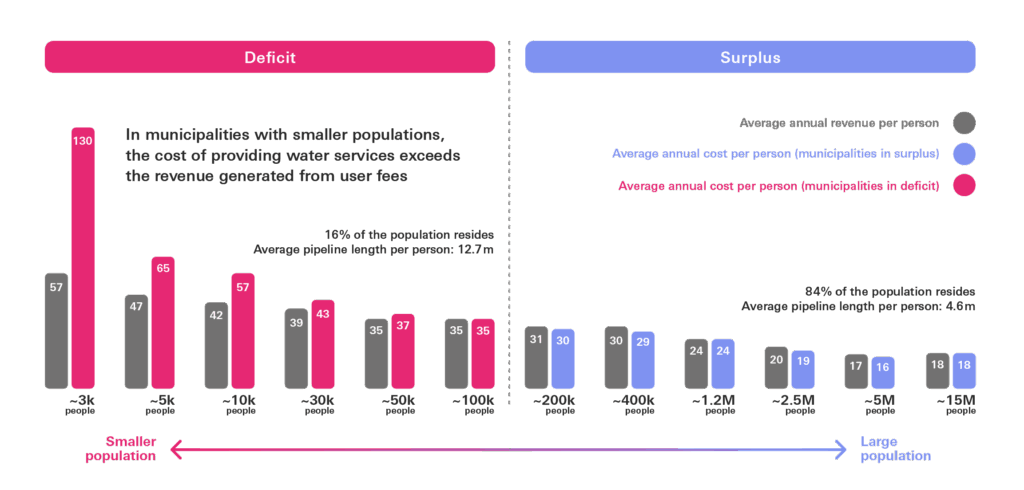
In response to these developments, the government’s “Basic Policy on Economic and Fiscal Management and Reform 2025 — Toward a Society Where Tomorrow Is Better Than Today” (the Basic Policy 2025), approved by the Cabinet in June 2025, explicitly calls for the early practical implementation of decentralized water and sewerage systems. Furthermore, the Ministry of Land, Infrastructure, Transport and Tourism’s Basic Policy Review Committee on Water and Sewerage Systems has been discussing the establishment of a “best-mix” approach that appropriately combines centralized and decentralized systems. This shift toward self-sustaining, decentralized infrastructure is also clearly reflected in the First Mid-term Plan for National Resilience Implementation (Reiwa 7), scheduled for formulation in the same year.
Traditional centralized infrastructure faces a structural challenge in that as population density declines, the per capita cost of service provision rises, making its sustainability limited in a declining population society. Additionally, the growing frequency of natural disasters has exposed vulnerabilities in the current system, which relies heavily on extensive piped networks.
In light of this, there is an urgent need to reconstruct water infrastructure based on a “best-mix” approach—an optimized combination of centralized and decentralized systems—tailored to local population sizes and geographic characteristics.
In response to these developments, the government’s “Basic Policy on Economic and Fiscal Management and Reform 2025 — Toward a Society Where Tomorrow Is Better Than Today” (the Basic Policy 2025), approved by the Cabinet in June 2025, explicitly calls for the early practical implementation of decentralized water and sewerage systems. Furthermore, the Ministry of Land, Infrastructure, Transport and Tourism’s Basic Policy Review Committee on Water and Sewerage Systems has been discussing the establishment of a “best-mix” approach that appropriately combines centralized and decentralized systems. This shift toward self-sustaining, decentralized infrastructure is also clearly reflected in the First Mid-term Plan for National Resilience Implementation (Reiwa 7), scheduled for formulation in the same year.
Traditional centralized infrastructure faces a structural challenge in that as population density declines, the per capita cost of service provision rises, making its sustainability limited in a declining population society. Additionally, the growing frequency of natural disasters has exposed vulnerabilities in the current system, which relies heavily on extensive piped networks.
In light of this, there is an urgent need to reconstruct water infrastructure based on a “best-mix” approach—an optimized combination of centralized and decentralized systems—tailored to local population sizes and geographic characteristics.
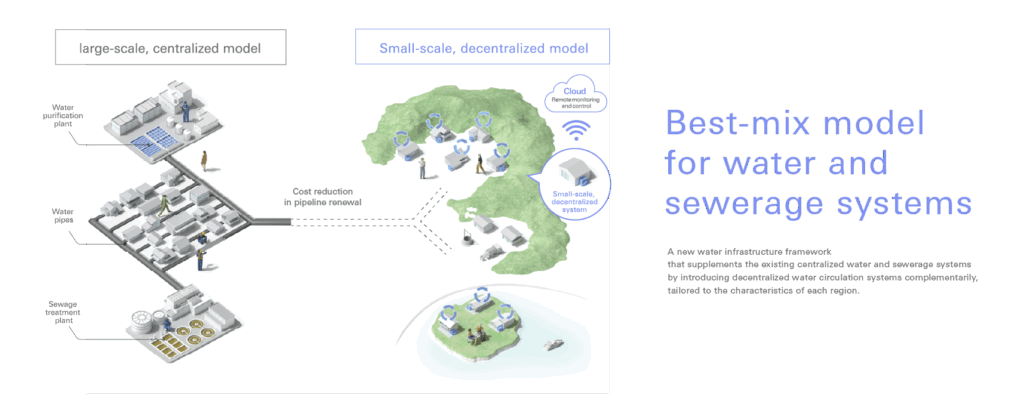
WOTA’s Decentralized Water Circulation System
As a new solution to the structural challenges facing water and sewerage funding, WOTA has developed the world’s first (※2) household water circulation system, the “WOTA Unit.”
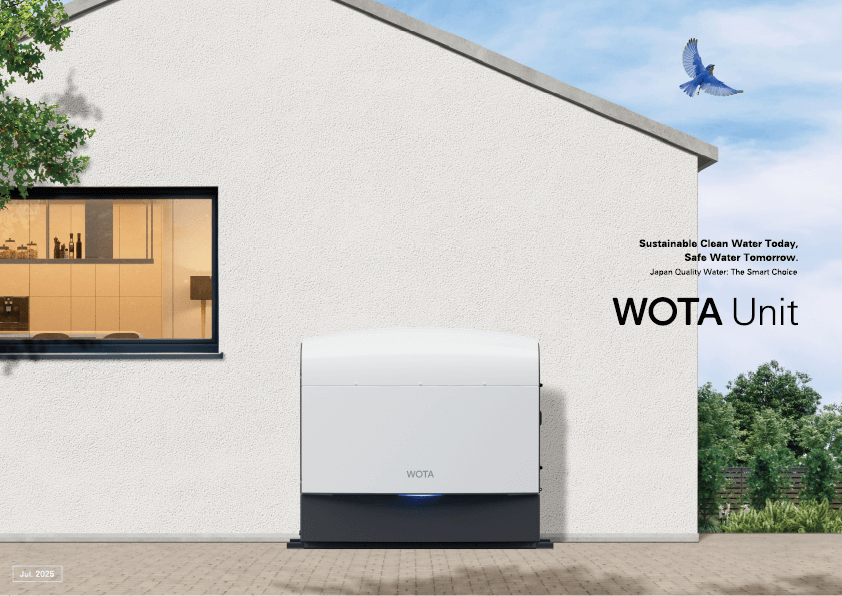
The WOTA Unit is a decentralized water circulation system that purifies up to 97% (※3) of household wastewater—from bathrooms, kitchens, laundry, and other domestic uses—into safe, reusable water, enabling water reuse without connection to conventional water and sewerage networks. The system is designed to supplement any water shortages with rainwater or other sources, allowing for flexible implementation suited to regional conditions regardless of the presence or absence of conventional infrastructure.
※2: This is the world’s first water circulation system that (i) operates as a small-scale decentralized system for household use, (ii) achieves over 90% water recycling rate for domestic water including shower, handwashing, and other uses involving direct human contact, (iii) complies with WHO drinking water standards and satisfies all 51 parameters of Japanese tap water quality, and (iv) is designed for mass production.
※3: The recycling rate may vary depending on the usage environment and water utilization methods.
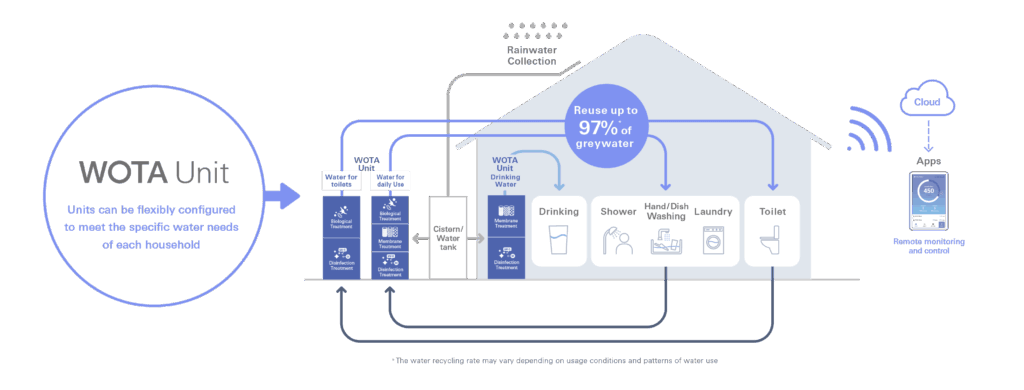
The system consists of three modular units: (i) a drinking water unit, (ii) a domestic (non-potable) water unit, and (iii) a toilet water unit. These can be combined flexibly according to regional and facility-specific needs as follows:
- Pattern A: Drinking water + Domestic water + Toilet water
- Pattern B: Domestic water + Toilet water
- Pattern C: Domestic water + Septic tank (toilet water is treated via the septic tank)
Note: The drinking water unit can be supplied via water dispensers, bottled water, etc. Additionally, a rainwater-based drinking water supply system is currently under development. WOTA’s decentralized water circulation system is supported by the New Energy and Industrial Technology Development Organization (NEDO) through its Deep Tech Startup Support Fund / Deep Tech Startup Support Program, as well as by the Cabinet Office and the Ministry of Economy, Trade and Industry through the Small Business Innovation Research (SBIR) program. These initiatives support verification for mass production development and real-world implementation. In 2025, the system passed Technology Readiness Level (TRL) 6 and is currently advancing to TRL 7, which involves demonstration under actual environmental conditions.
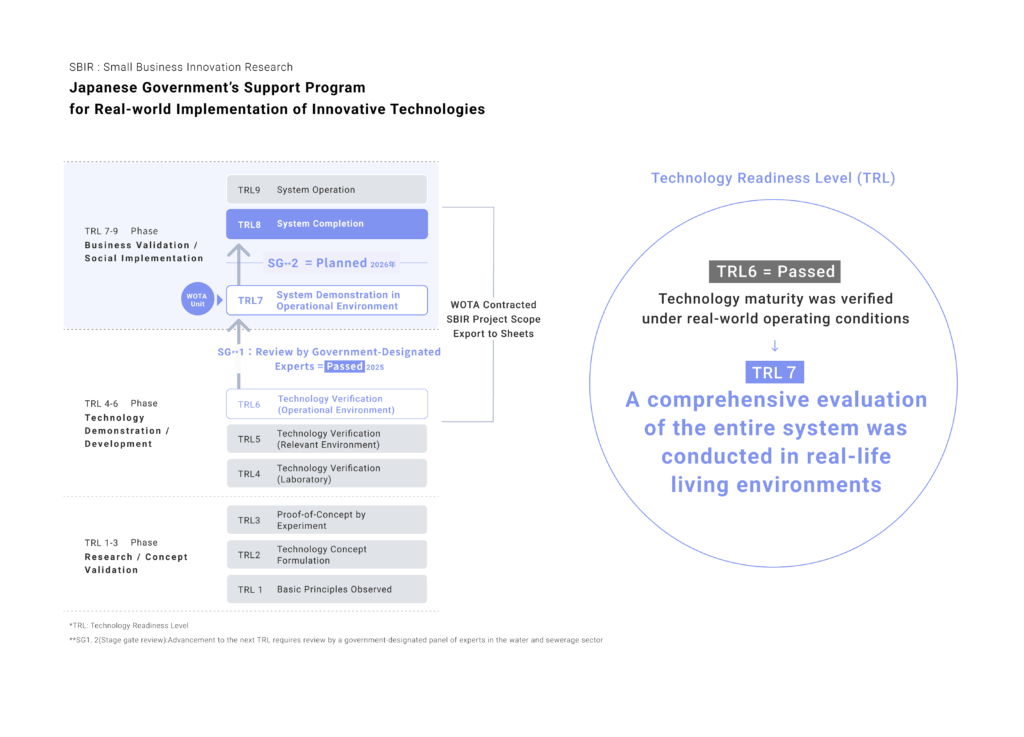
Launch of the “Water 2040 Fund – Decentralized Water Circulation System Implementation Fund”
Decentralized water circulation systems are gaining attention as practical and adaptable solutions for regions facing structural challenges in maintaining and upgrading water and sewerage infrastructure. However, local governments encounter operational hurdles in implementing these systems, such as a lack of specialized personnel and limited financial resources.

Water 2040 Fund
An infrastructure fund that supports the entire process of decentralized system implementation
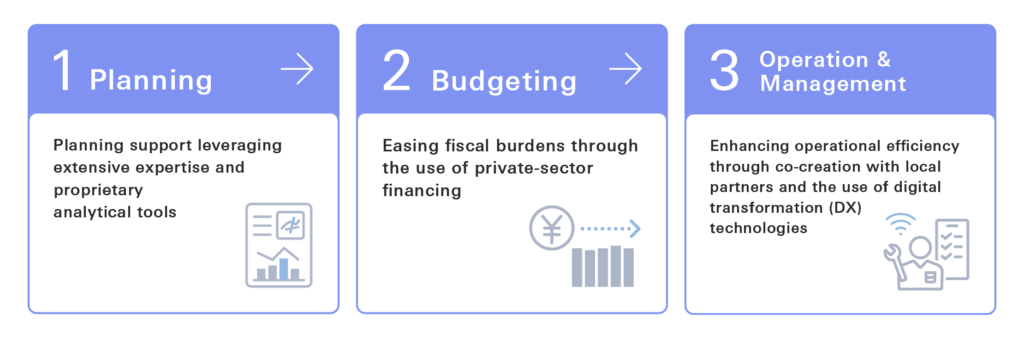
In response to these circumstances, WOTA is establishing the “Water 2040 Fund – Decentralized Water Circulation System Implementation Fund” in collaboration with partner financial institutions and local businesses.
This fund provides comprehensive, hands-on support for every stage of decentralized system implementation. In addition to helping municipalities ease fiscal burdens through the use of private-sector financing, the fund provides support in planning and design using WOTA’s proprietary analytical tools, as well as assistance in building post-installation operation and management frameworks. Furthermore, through co-creation with regional partners and the integration of digital transformation (DX) technologies, the fund supports every phase of decentralized system deployment—from initial planning to long-term operation and maintenance.
Signed an agreement aimed at establishing a financing and funding scheme

The total scale of the fund is planned to be approximately 10 billion yen, and the number of municipalities eligible for support will be limited.
Municipalities interested in applying are encouraged to attend an information session or schedule an individual consultation.
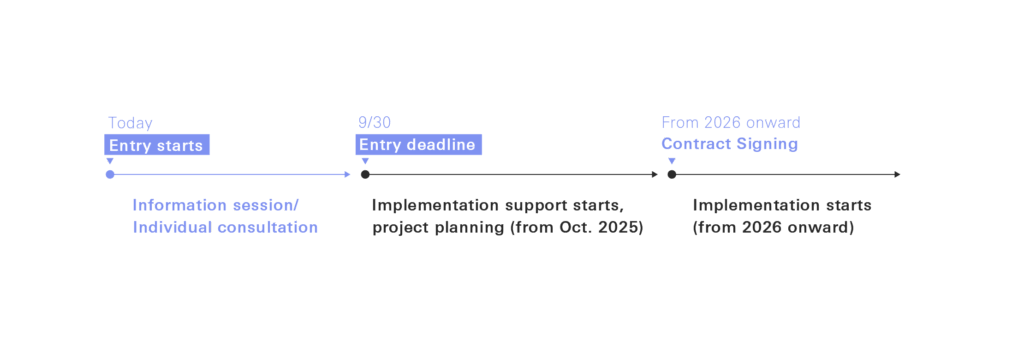
Registration Process
WOTA is now accepting applications from municipalities seeking support for the implementation of decentralized water circulation systems through the “Water 2040 Fund” (Application deadline: September 30, 2025).
The entry process involves the following three steps:
① Optional Online Information Session, ② Mandatory Individual Consultation, and ③ Non-binding Entry.
Three Steps to Entry
Step 1: Online Information Session (Optional)
We will host online information sessions to explain the purpose of the fund and the support it offers. These are recommended for municipalities that would like to first gain a general understanding of the initiative. Municipalities already familiar with the fund may choose to skip this step.
- Dates: Wednesday, July 23 / July 30 / August 6
- Time: 14:00–15:00
- Format: Online (advance registration required)
👉 Register here:
https://water-2040-fund.wota.co.jp/form/2040-program/
Inquiries: water_2040_fund@wota.co.jp
Step 2: Individual Online Consultation (Mandatory)
For municipalities wishing to proceed with an entry, WOTA will provide a complimentary mapping simulation, visualizing areas of concern within the municipality using a 500-meter mesh. Based on this data, we will assist in identification of key challenges, discuss potential implementation sites, and conduct an initial feasibility discussion.
Step 3: Application Submission (Deadline: September 30, 2025 — Non-binding)
We are now accepting non-binding applications from municipalities interested in receiving support for implementing decentralized water circulation systems through the Water 2040 Fund.
- Note 1: Participation in this process is free of charge, but support will be provided on a first-come, first-served basis.
- Note 2: Even municipalities that do not require financing (e.g. due to other funding sources) are also eligible to receive planning support by submitting an application.
Toward a Sustainable Water Infrastructure for the Next Generation
WOTA has prioritized regions where maintaining traditional water and sewerage infrastructure has become increasingly difficult, gradually implementing and demonstrating decentralized water circulation systems on the ground.
With the establishment of the Water 2040 Fund, we are entering a full-scale phase aimed at accelerating the early practical implementation of decentralized systems. Going forward, we aim to establish a standardized best-mix infrastructure model by promoting flexible, locally adapted implementations and conditions.
By 2040, WOTA is committed to contributing to both the financial sustainability of water infrastructure and the realization of sustainable water systems—through ground-level support and continued technological innovation.
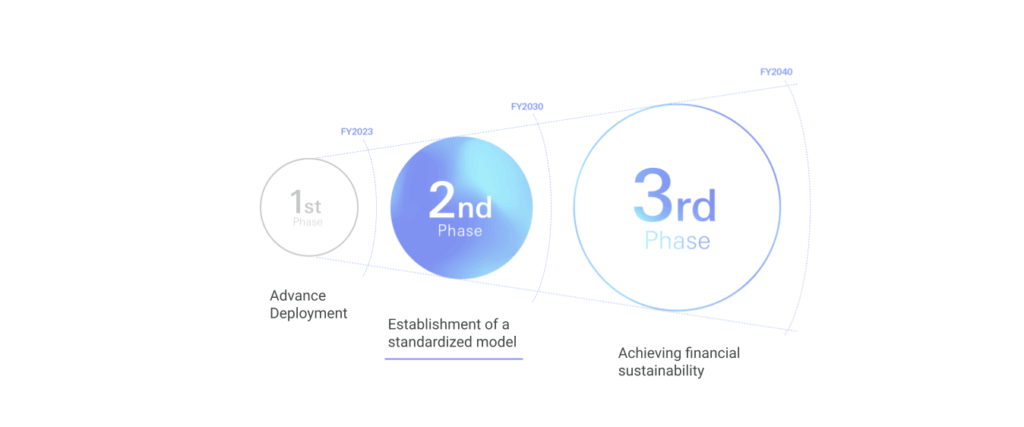
Comments from Municipalities and Corporate Partners
Mr. Toshihiko Imae, Mayor of Takehara City, Hiroshima Prefecture
Takehara is a beautiful city surrounded by rich natural landscapes. However, as the population declines, the challenges of maintaining infrastructure are becoming increasingly severe each year. In particular, water and sewerage systems are the foundation of daily life, and it is the municipality’s responsibility to pass these on to the next generation in a sustainable manner. Together with WOTA’s groundbreaking efforts, we are committed to creating a community where every citizen can live with peace of mind.
Mr. Masuhiro Izumiya, Mayor of Suzu City, Ishikawa Prefecture & Mr. Naoyuki Kaneda, Vice Mayor
It has been approximately a year and a half since the Noto Peninsula Earthquake, and about ten months since the Oku-Noto torrential rains. We have continued discussions with citizens about “a new vision for the city” while advancing full-scale reconstruction efforts of housing, roads, rivers, and water infrastructure.
Immediately after the disaster, WOTA provided essential support to Suzu—severely affected—through the deployment of water circulation systems backed by cutting-edge technology and swift, practical response.
Going forward, we will gather strength from diverse sectors, including WOTA, and aim to achieve a “resilient and cutting-edge reconstruction” that embraces both advanced technology and art.
Mr. Hidenori Tsuruoka, Mitsubishi UFJ Trust and Banking Corporation,
Our company sees creation of new value through the resolution of societal challenges as its core mission.
In this regard, WOTA’s initiatives—addressing the essential issue of water and sewerage infrastructure—essential foundations of daily life—are highly meaningful.
Beyond providing capital, we are committed to deepening our collaboration in the implementation phase, including financing support to accelerate local adoption, and work together to address water challenges nationwide.
Mr. Kenichiro Fukuda, EY Strategy and Consulting Co., Ltd.,
Japan’s water and sewerage infrastructure is facing a combination of interrelated challenges, including population decline, aging assets, fiscal constraints, and workforce shortages. In rural areas in particular, maintaining traditional systems is becoming increasingly difficult.
What is now needed is a fundamental restructuring that embraces decentralized systems and a diverse range of solutions through innovation.
To achieve sustainable infrastructure, it is essential to take an integrated approach—requires more than just technological advancement—it demands a holistic approach that also encompasses institutional design and ground-level implementation.
About WOTA Corp.
WOTA Corp. is a private company committed to solving the structural challenges of global water issues. Since its founding in 2014, the company has developed decentralized water circulation systems and autonomous water treatment control technologies that recycle household wastewater for maximum reuse, tackling issues such as water scarcity, pollution, and uneven distribution.
WOTA has already launched two products that support emergency water use during outages and contribute to improved public hygiene. In addition, the company has developed a household water circulation system that enables daily water use, and has begun providing water services in select regions both in Japan and abroad.
👉 Learn more: https://wota.co.jp/en/
